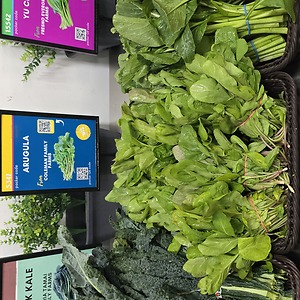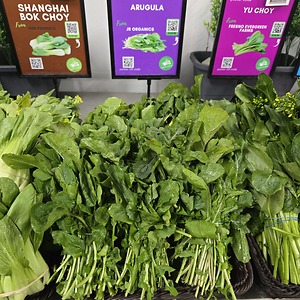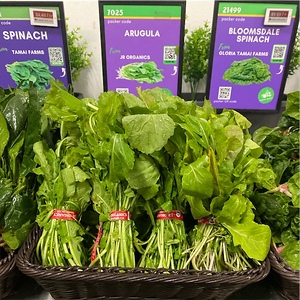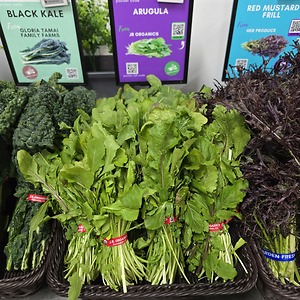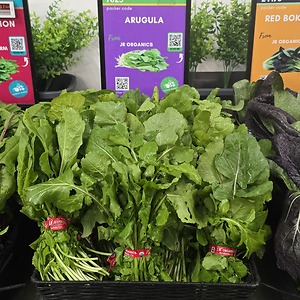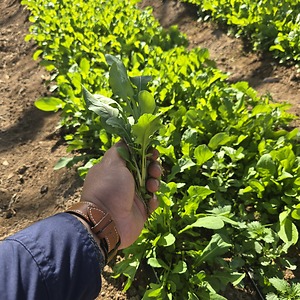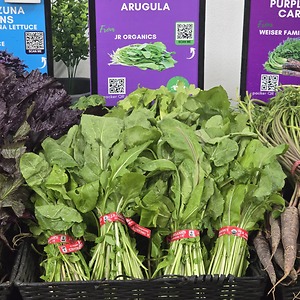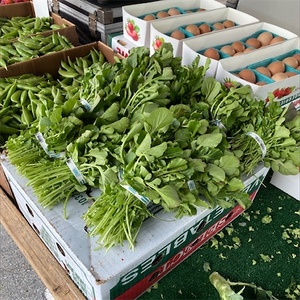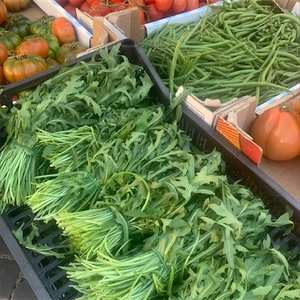


Arugula
Estimated Inventory, lb : 10.49
This item was last sold on : 07/31/25
Description/Taste
Arugula consists of deeply lobed, flat leaves connected to fibrous stems, growing in a loose, basal rosette. The leaves are generally harvested small in size, averaging 7 to 10 centimeters in length, and are smooth and bright green with prominent veining and frilled edges. The leaves are also attached to a white to pale green, fibrous stem, contributing to the leaf’s crisp, succulent, and slightly chewy consistency. Arugula can be picked young, and the immature greens carry a milder, sweeter flavor with a tender texture. The leaves can also be harvested mature, developing a distinct peppery, somewhat bitter, and vegetal taste with subtle mustard, nuts, and grass notes.
Seasons/Availability
Arugula is available year-round.
Current Facts
Arugula, botanically classified as Eruca sativa, is an ancient green growing 20 to 70 centimeters in height, belonging to the Brassicaceae or mustard family. The deeply lobed, herbaceous annual is native to the Mediterranean, where it has been used in medicinal and culinary applications for thousands of years. Arugula is also known by other names in Europe, including Rucola, Rocket, Roquette, and Ruchetta, and there are multiple varieties generally labeled under the Arugula descriptor, varying slightly in appearance and flavor. In the present-day, Arugula is favored worldwide as a peppery salad green, especially in Europe and North America, and has also become a common leaf used as both an herb and vegetable in a wide variety of culinary applications.
Nutritional Value
Arugula is an excellent source of vitamin A to maintain healthy organ functioning and vitamin C to strengthen the immune system while reducing inflammation. The peppery greens also provide calcium to protect bones and teeth and lower amounts of folate, iron, vitamin K, copper, zinc, and magnesium. In addition to vitamins and minerals, Arugula contains glucosinolates, which are compounds believed to have detoxifying properties and also give the leaves their pungent, slightly bitter flavor.
Applications
Arugula has a nutty, peppery flavor well suited for fresh and lightly cooked applications such as sautéing, blanching, and stir-frying. The greens can be used as a vegetable or an herb, and they can be utilized fresh, added at the end of cooked applications, or lightly cooked to create a milder flavor. The leaves can be tossed fresh into salads, blended into pesto, layered into sandwiches and burgers, or used as an edible bed for roasted meats. Arugula can also be floated on top of soups and stews, used as a topping over pizza, stirred into pasta and rice dishes, used as a spinach substitute for omelets, or served with boiled potatoes. Arugula pairs well with fruits such as berries, melons, pears, and citrus, cheeses, including gorgonzola, parmesan, burrata, goat, and blue, olives, tomatoes, broccolini, nuts such as walnuts, almonds, and pine, meats such as beef, poultry, and turkey, seafood, and anchovies. The deeply lobed leaves will keep 3 to 10 days when wrapped in a paper towel and kept in a plastic bag in the refrigerator's crisper drawer.
Ethnic/Cultural Info
Arugula has historically been a staple ingredient in Italian cuisine as the subtly bitter, spicy cultivar was one of the most popular salad greens used in Ancient Rome. The peppery, frilled leaves were frequently mixed with romaine and chicory to create a balanced salad, and the greens were either served before the meal as a mild digestive or served after the main course to not compromise the flavor of the wine being served. Arugula was also blended into sauces for added potency and was notably used in the famous dish moretum. The name moretum roughly translates to mean “salad” and was traditionally a combination of cheeses, greens, oils, vinegar, and herbs pounded together using a mortar and pestle and served with bread. Another version of a Roman Arugula-herb sauce was poured over salted fish and served as an appetizer with olives, bread, or vegetables. Arugula provided pungency in sauces and was believed to help awaken drowsy people, bring good luck, and provide a clear mind. In the modern-day, Arugula is still a favorite green for Italian salads and is incorporated into pasta, pizza, rice, and roasted meat dishes. Arugula is also used to make rucolino, an after-dinner liqueur served as a digestif made from spirits infused with arugula, lemons, and spices.
Geography/History
Arugula is believed to be native temperate regions of the Mediterranean in Southern Europe and has been growing wild since ancient times. The plant's first written record dates back to the 1st century CE, and the spicy greens were widely used in Ancient Egyptian and Roman empires. Arugula was once believed to be an aphrodisiac, used in combination with lavender as a love potion to awaken the mind and body. Later in the early middle ages, the greens were naturalized in regions of Northern and Western Europe and became a common salad green incorporated in both upper class and civilian kitchens. Arugula was eventually introduced to the New World through European immigrants, and over time, the greens have experienced periods of immense popularity to seasons of disdain, with the most recent surge in the 1990s among American chefs and consumers. Today Arugula is common worldwide, cultivated through commercial growers and sown in home gardens as a pest-resistant plant. The nutty greens are also sold through farmer’s markets, specialty grocers, and supermarkets.
Featured Restaurants
Restaurants currently purchasing this product as an ingredient for their menu.
| Fairmont Grand Del Mar | San Diego CA | 858-314-1975 |
| The WestBean Coffee Roasters BH | San Diego CA | 619-709-3232 |
| The Plot Restaurant (Costa Mesa) | Costa Mesa CA | 714-852-3181 |
| Pali Wine Company | San Diego CA | 310-893-0038 |
| Little Victory Wine Market | Carlsbad CA | 310-738-3380 |
| Carruth Cellars Urban Winery | San Diego CA | 619-546-9300 |
| The Whaling Bar | La Jolla CA | 858-355-9218 |
| South O Brewing Catering | Oceanside CA | 925-381-5392 |
| The WestBean Coffee Roasters | San Diego CA | 619-709-3232 |
| Merenda | Oceanside CA | 703-459-4145 |
| Sago | Encinitas CA | 858-382-4047 |
| Fresh Sushi Catering | Carlsbad CA | 858-344-7098 |
| Hyatt Islandia | San Diego CA | 619-224-1234 |
| Hotel Indigo | San Diego CA | 619-295-3172 |
| 4 The Love Of Lemons | San Diego CA | 760-613-1104 |
| Lodge at Torrey Pines Grill | San Diego CA | 858-453-4420 |
| Moniker Outpost | San Diego CA | 253-820-1600 |
| Daffodil Cafe | San Diego CA | 858-461-7788 |
| Understory | San Diego CA | 516-507-0101 |
| Fishery | San Diego CA | 858-272-9985 |
| Wildland | Carlsbad CA | 619-385-0914 |
| Mabel's Gone Fishing | San Diego CA | 619-228-9851 |
Recipe Ideas
Recipes that include Arugula. One



